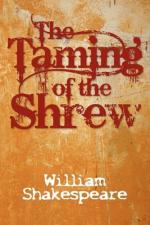|
This section contains 12,977 words (approx. 44 pages at 300 words per page) |

|
SOURCE: “Household Kates: Domesticating Commodities in The Taming of the Shrew,” in Shakespeare Quarterly, Vol. 47, No. 2, Summer, 1996, pp. 110-31.
In the essay below, Korda examines the theme of domestic economy in The Taming of the Shrew, arguing that Elizabethan society's “cultural anxiety surrounding the housewife's new managerial role with respect to household cates … prompted Shakespeare to write a new kind of shrew-taming narrative.”
Commentary on Shakespeare's The Taming of the Shrew has frequently noted that the play's novel taming strategy marks a departure from traditional shrew-taming tales. Unlike his predecessors, Petruchio does not use force to tame Kate; he does not simply beat his wife into submission.1 Little attention has been paid, however, to the historical implications of the play's unorthodox methodology, which is conceived in specifically economic terms: “I am he am born to tame you, Kate,” Petruchio summarily declares, “And bring you from a wild Kate...
|
This section contains 12,977 words (approx. 44 pages at 300 words per page) |

|


